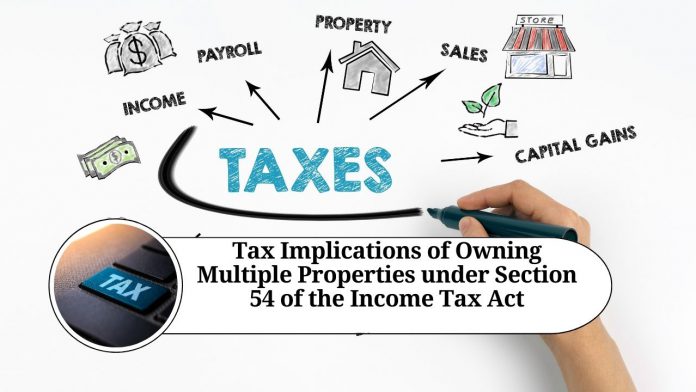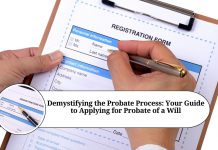When it comes to buying a house, many individuals opt to purchase more than one property for various reasons. However, owning more than one house can come with its own set of tax implications. That’s where Section 54 of the Income Tax Act comes into play.
Section 54 of the Income Tax Act provides relief to taxpayers who own more than one house and have sold a house or property. This section provides an exemption from capital gains tax if the proceeds from the sale of the property are invested in purchasing another house.
The section specifies that the exemption will only apply if the taxpayer invests the capital gains amount in a new residential property within a specified time frame. The time limit for investing in a new house is two years from the date of sale of the old property. Alternatively, the taxpayer can also invest in a new property one year before the sale of the old property.
It is important to note that the exemption under Section 54 is available only on long-term capital gains. This means that the property sold should have been held by the taxpayer for at least two years before it was sold. Additionally, the exemption is only available to individuals and not to companies or partnerships.
If the taxpayer invests only a part of the capital gains amount in purchasing a new property, then the exemption will be allowed only to the extent of the amount invested in the new property. The remaining amount will be taxable as capital gains. However, if the taxpayer invests more than the capital gains amount in a new property, then the entire capital gains will be exempt.
In case the new house is sold within three years of purchase, then the capital gains tax exemption provided under Section 54 will be reversed. The amount of capital gains tax exemption claimed earlier will be treated as income in the year in which the new property is sold.
As mentioned earlier, Section 54 provides an exemption from capital gains tax if the proceeds from the sale of a property are invested in purchasing another residential property. The objective of this section is to encourage taxpayers to invest their capital gains in real estate, thereby promoting investment and growth in the housing sector.
It is worth noting that the exemption under Section 54 is available only on the sale of a residential property. Therefore, if a taxpayer sells a commercial property or land, the exemption under Section 54 will not be applicable.
Another important point to keep in mind is that the exemption is only available for the purchase of a new residential property. This means that the taxpayer cannot claim the exemption if they invest the proceeds from the sale of a property in renovating or repairing an existing residential property. The new residential property should be purchased within the specified time frame, and it should be used for personal residence or rented out.
Furthermore, the exemption under Section 54 is available only if the taxpayer owns more than one house. If the taxpayer owns only one house and sells it, the capital gains tax will be applicable, and the exemption under Section 54 will not be available.
Let’s consider an example to understand how the exemption under Section 54 works. Suppose Mr. A sells his residential property for Rs. 1 crore, and the long-term capital gains on the sale amount to Rs. 50 lakhs. He invests the entire amount in purchasing a new residential property within two years of selling the old property. In this case, he can claim an exemption of Rs. 50 lakhs from capital gains tax.
On the other hand, if Mr. A invests only Rs. 40 lakhs out of the capital gains amount in purchasing a new residential property, then the exemption will be allowed only to the extent of Rs. 40 lakhs. The remaining Rs. 10 lakhs will be taxable as capital gains.
Conclusion
Section 54 of the Income Tax Act is a useful provision for taxpayers who own more than one house and wish to sell one of their properties. The exemption provided under this section can help taxpayers save a significant amount of money in capital gains tax. However, it is important to comply with the conditions and timelines specified under this section to claim the exemption.
Read more useful content:
- section 145 of income tax act
- section 10e of income tax act
- section 9 of the income tax act
- section 94b of income tax act
- section 206aa of income tax act
Frequently Asked Questions (FAQs)
Q: Who can claim exemption under Section 54 of the Income Tax Act for owning more than one house?
A: Only individual taxpayers can claim exemption under Section 54 for owning more than one house. Companies or partnerships are not eligible for the exemption.
Q: Is the exemption under Section 54 available only for the sale of a residential property?
A: Yes, the exemption under Section 54 is available only for the sale of a residential property. If a taxpayer sells a commercial property or land, the exemption under Section 54 will not be applicable.
Q: What is the time limit for investing in a new residential property to claim exemption under Section 54?
A: The taxpayer must invest the proceeds from the sale of the old property in a new residential property within two years from the date of sale of the old property. Alternatively, the taxpayer can also invest in a new property one year before the sale of the old property.
Q: Is the exemption under Section 54 available for renovation or repair of an existing residential property?
A: No, the exemption under Section 54 is available only for the purchase of a new residential property. The taxpayer cannot claim the exemption if they invest the proceeds from the sale of a property in renovating or repairing an existing residential property.
Q: What happens if the new residential property is sold within three years of purchase?
A: If the new residential property is sold within three years of purchase, then the capital gains tax exemption provided under Section 54 will be reversed. The amount of capital gains tax exemption claimed earlier will be treated as income in the year in which the new property is sold.
Q: Can the taxpayer claim the exemption under Section 54 if they own only one house?
A: No, the exemption under Section 54 is available only for taxpayers who own more than one house. If the taxpayer owns only one house and sells it, the capital gains tax will be applicable, and the exemption under Section 54 will not be available.
Q: Is the exemption under Section 54 applicable for the purchase of a second house or any subsequent house?
A: Yes, the exemption under Section 54 is applicable for the purchase of a second house or any subsequent house, as long as the taxpayer meets the conditions specified under the section.
Q: Is the exemption under Section 54 available for the purchase of a commercial property?
A: No, the exemption under Section 54 is available only for the purchase of a new residential property. The taxpayer cannot claim the exemption if they invest the proceeds from the sale of a property in purchasing a commercial property.





















